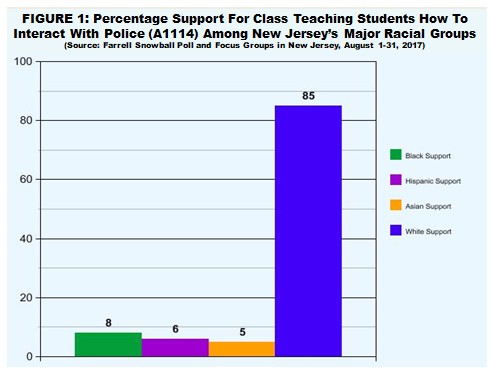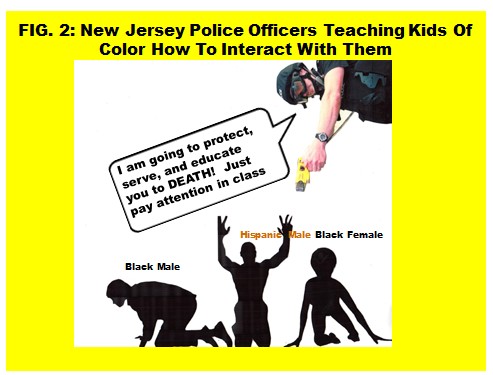|
The
Farrell Report spent the month of August 2017 polling in New
Jersey Counties with size able concentrations of people of
color--Essex, Passaic, Bergen, Camden, Hudson, Mercer, and Union--and
communicating with key informants who lead grassroots community
organizations and a cross section of rank-and-file minority and
majority citizens on their assessments of the proposed legislation
for the class, AB1114, which is designed to instruct K-12 students on
how to act when they have encounters with police. This is a response
to the escalating number of police shootings and assaults of males
(and females) of color. There was a special emphasis on cities where
these events have been most frequent--Newark, Irvington, Atlantic
City, Trenton, Bridgeton, Camden, and Paterson.
The
findings indicate that minorities feel blindsided by the seven
Democratic African American and Hispanic Assemblywomen who are the
primary sponsors of this odious bill. Prior to and during the
creation of this lawmaking, there were no town hall meetings held to
solicit input from constituents in any of the aforementioned counties
and cities. Since it was passed unanimously by the New Jersey
Assembly during the early summer of 2017, AB1114 has generated
controversy throughout the nation with numerous publications weighing
in against it. However, police officers and their devotees
overwhelmingly endorsed this effort across the nation and in New
Jersey where two major police organizations were recruited to assist
in developing the curriculum. The results are presented below along
with a discussion of their implications.
Figure
1 shows that among New Jersey’s major racial groups, Blacks,
Hispanics, and Asians all registered approval levels of eight, six,
and five percent, respectively. Comparatively, eighty-five percent
of Whites backed the bill which is consistent with their overall
support of police officers irrespective of their questionable actions
in the line of duty.

This
stark contrast between Whites and minority groups can be explained in
part by the fact that more than ninety percent of all disputed police
attacks and killings have been experienced by males and females of
color throughout New Jersey. Therefore, there was little reason for
Whites to have concerns about these issues. Moreover, the prevailing
view in the majority community is that minorities are primarily at
fault for their victimization by police officers who are seen as
always acting in good faith. Thus, the predominant opinion among
many is that a good way to ameliorate these situations is to teach
K-12 students, mostly students of color, how to interact with police,
total deference if you will, largely ignoring their own rights during
these conflicts. In other words, instruction of students, not
improved training of police officers to become culturally and
socially competent, is the answer to this accelerating
police-community crisis.
Lawrence
Hamm, Chairman of Peoples Organization for Progress (POP), New
Jersey’s premier grassroots advocacy group for social justice,
believes this legislation indicates that “… it would
be the fault of teachers if police continue to kill and assault our
youth because they would have failed to provide effective instruction
for students to show the proper respect and deference.”
Hence, teachers would be assigned yet another task in addition to
already being held accountable, via Student Growth Objectives (SGOs)
and PARCC (Partnership for Assessment of Readiness for College and
Careers) tests, to provide high quality education to overcome
poverty, hunger, neighborhood violence, family dysfunction,
homelessness, etc. Figure 2 was constructed based on focus group
reactions. In addition, in response to ongoing police brutality in
New Jersey, Chairman Hamm and his POP members have led demonstrations
in remembrance of Abdul Kamal, Jerome Reid, Kashad Asford, Radazz
Hearns, and others for eighty-five straight Mondays to bring
attention to these targets of problematic police behavior.

Several respondents
viewed AB1114 as giving police officers the license to engage in any
behavior that popped into their mind. They also felt that President
Trump encouraged rough treatment of people in police custody during
his July 29, 2017 comments to the Suffolk County, New York Police
Department (SCPD), saying that, “When you
guys put somebody in the car and you’re protecting their head,
like don’t hit their head? They just killed somebody, don’t
hit their head? I said you can take the hand away (sic).”
Nonetheless, to
their credit, police chiefs in New York and around the world
condemned Trump’s remarks, calling them unprofessional and
stating that they sent the wrong message to law enforcement and the
general public.
Despite
solid Assembly backing of AB1114, it is unlikely to pass into law
before 2018, if ever. The reason for it being delayed and/or
scuttled in the New Jersey Senate is that the state’s
gubernatorial election is only two months away, November 7, 2017.
Phil Murphy, the Democratic candidate for Governor, quietly used his
influence in the Senate, controlled by his Democratic colleagues, to
sideline the planned statute whose lead sponsor is his Lt. Governor
running mate, Assemblywoman Sheila Oliver. Murphy was concerned that
the growing controversy around AB1114 could negatively impact
minority voter turnout among Blacks, Hispanics, and Asians given
their robust opposition to the bill as noted in Figure 1. As a
consequence, he wants to keep it out of public discourse.
Irrespective
of his double-digit lead over his Republican opponent, current Lt.
Governor Kim Guadagno, and a projected certain victory, Murphy could
be in danger of losing in the last days of the campaign as did
Hillary Clinton in the 2016 presidential election. A Democrat cannot
win a statewide election in New Jersey unless s/he receives the
overwhelming share of the minority vote with a turnout commensurate
with the statewide average. Nevertheless, Murphy has been helped by
Guadagno’s refusal to condemn Republican Assemblyman Parker
Space for recently posing with his wife in front of a Confederate
flag. Murphy accused Guadagno of failing the test to lead by
equivocating in her response to Assemblyman Space’s action.

It
remains to be seen, however, whether negative minority attitudes
toward AB1114 will affect minority turnout in the November 7th
election. Hillary garnered the overwhelming share of the African
American, Hispanic, and Asian vote in 2016, but she did not get
corresponding minority turnout in Wisconsin, Michigan, and
Pennsylvania which would have made her Madam President.
On
the other hand, this legislation should never have been introduced in
the first place.
|

